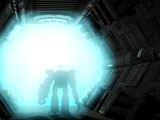 Shattered Galaxy would be, in my opinion, the hope for the RTS
genre. Having been a fan of this type of game for a long time, I have become disillusioned
with the monotony of them. It seemed every game just tended to follow the same formula for
success: build all the necessary buildings in order to have access to the newest units and
use them in order to beat out the other team. There was no need for strategy, tactics, or
even a brain. Just place your buildings next to the most plentiful resources and churn out
enough units to beat the other guy.
Shattered Galaxy would be, in my opinion, the hope for the RTS
genre. Having been a fan of this type of game for a long time, I have become disillusioned
with the monotony of them. It seemed every game just tended to follow the same formula for
success: build all the necessary buildings in order to have access to the newest units and
use them in order to beat out the other team. There was no need for strategy, tactics, or
even a brain. Just place your buildings next to the most plentiful resources and churn out
enough units to beat the other guy.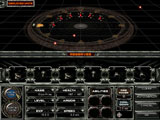 Shattered Galaxy decided to go
in a completely different direction – all the focus of the game centers on the actual
warfare and the methodology used in adapting to the actions of the enemy. Battles begin to
resemble the final minutes of many of my Starcraft experiences when I engage in the final
rush on an enemy stronghold. It would often devolve into a mob where I couldn’t even
tell which units were mine. That was what I lived for – a screen so full of missiles,
guns, explosions and carnage that I would just sit back and watch. What makes this mess so
much more enjoyable is the knowledge that there are hundreds of other people all over the
world who are helping to create the same mass destruction as me.
Shattered Galaxy decided to go
in a completely different direction – all the focus of the game centers on the actual
warfare and the methodology used in adapting to the actions of the enemy. Battles begin to
resemble the final minutes of many of my Starcraft experiences when I engage in the final
rush on an enemy stronghold. It would often devolve into a mob where I couldn’t even
tell which units were mine. That was what I lived for – a screen so full of missiles,
guns, explosions and carnage that I would just sit back and watch. What makes this mess so
much more enjoyable is the knowledge that there are hundreds of other people all over the
world who are helping to create the same mass destruction as me.
The premise of the story is simple: A small group of humans have been thrown across the
galaxy as a result of investigating an alien artifact found on the Earth. This small band
of humans have separated into factions in an effort to control the meager resources found
in the new solar system in which they find themselves. There don’t seem to be
significant ideological differences between the various factions, so the idea of a plot
driven storyline does not exist here.
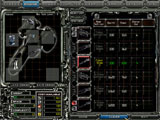 But
who cares? Especially when dealing with a MMORTS like this, the idea of the narrative is
not created by a progression of events or stories, but rather by the actions of the
players online at any given moment. For example, the battlefields are simulated
territories across the face of the planet. The number of territories a faction controls at
any given moment determines the influence, power, and resources of that particular
faction. As players from various factions log on and log off, the balance of power is
tenuous at best. I have seen control of a single territory change more than 10 times in an
hour. Factions wax and wane so quickly, there is never a sense of complacency or boredom
when online.
But
who cares? Especially when dealing with a MMORTS like this, the idea of the narrative is
not created by a progression of events or stories, but rather by the actions of the
players online at any given moment. For example, the battlefields are simulated
territories across the face of the planet. The number of territories a faction controls at
any given moment determines the influence, power, and resources of that particular
faction. As players from various factions log on and log off, the balance of power is
tenuous at best. I have seen control of a single territory change more than 10 times in an
hour. Factions wax and wane so quickly, there is never a sense of complacency or boredom
when online.
When a new player logs onto the system, they are allowed to select a faction to join.
As was said before, there do not appear to be any significant ideological differences or
technological advantages to joining one faction over another (which might be something
that could change in the future). Once a faction is joined, the player is left to decide
how to progress. SG uses a hero system to allow for character development and growth.
Players are allowed to distribute attribute points in to Tactics (unit control), Clout
(political influence and access to new unit types), Education (access to new
technologies), and Mechanical Aptitude (access to faster unit alterations and
developments). This instills a human aspect to the battle; however, heroes do not fight
directly in the battle. Rather, they control small units (normally 6, though more can be
controlled based on the Tactics level of the individual player) that will participate in a
larger battle to control a specific territory. Skill points can be gained by participating
in battles and gaining experience based on the types of units you use. Specializations on
specific types of units often results in rapid levelling up, but can also result in
lopsided units that are not effective in all battle situations.
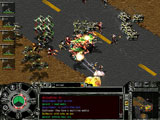 While
there is an emphasis on developing the Hero’s traits and skills, personal fortunes do
not exist; there is no individual massing of currency, which then favors heavily addicted
players over the casual player in this regard. Resources are defined by tribute received
by the territories controlled by each faction; individuals are given portions of this
tribute automatically by the faction, thus allowing irregular players access to the
materials necessary to enjoy the game without having to invest huge amounts of time to
build up their units, etc.
While
there is an emphasis on developing the Hero’s traits and skills, personal fortunes do
not exist; there is no individual massing of currency, which then favors heavily addicted
players over the casual player in this regard. Resources are defined by tribute received
by the territories controlled by each faction; individuals are given portions of this
tribute automatically by the faction, thus allowing irregular players access to the
materials necessary to enjoy the game without having to invest huge amounts of time to
build up their units, etc.
Players are allowed to build units at factories in the faction capital. These units,
branched into infantry, mobile, aerial, and alien units, are upgradeable and adaptable;
players can even chose how to equip them in various categories. This high level of
adaptability allows for a great deal of individualization during game play and allows for
a level of specialization rare for RTS games. Units also have the ability to increase in
experience based on their involvement in battles. As units increase in experience, their
hit points will increase and their battle effectiveness will expand. A extra bonus that I
find to be especially nice is that even though a unit might be destroyed on the field, the
hero can return to the factory and rebuild the unit with no loss of experience, equipment,
or level. This means that players can lose units without being overly punished. However,
the longer units exist on the field, the higher levels of experience they will receive.
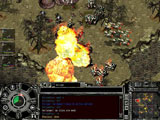 As
was mentioned before, Nexon tries to allow players natural routes for growth and
progression. This being the case, SG allows players to engage in different types of combat
in order to increase experience and the strength of their units. Heroes are allowed to
engage in simulated combat that allows for newer players to play with advanced units that
are not immediately available. This not only allows the player to grow accustomed to how
to use these units, it also allows heroes to understand how others might use these units
and how to defend against them. This aspect allows newer players to be able to participate
in battles with more advanced players and still be able to contribute to the progression
of the battle. Heroes can also engage in battles with native aliens. While these battles
do not provide experience to the hero, they will strengthen the individual units and allow
for battlefield experience against an artificial opponent before engaging in more
challenging modes against other single opponents or joining into full-fledged battles.
As
was mentioned before, Nexon tries to allow players natural routes for growth and
progression. This being the case, SG allows players to engage in different types of combat
in order to increase experience and the strength of their units. Heroes are allowed to
engage in simulated combat that allows for newer players to play with advanced units that
are not immediately available. This not only allows the player to grow accustomed to how
to use these units, it also allows heroes to understand how others might use these units
and how to defend against them. This aspect allows newer players to be able to participate
in battles with more advanced players and still be able to contribute to the progression
of the battle. Heroes can also engage in battles with native aliens. While these battles
do not provide experience to the hero, they will strengthen the individual units and allow
for battlefield experience against an artificial opponent before engaging in more
challenging modes against other single opponents or joining into full-fledged battles.
Once a hero begins to participate in full battles, the true joy of the game begins.
There are really so many different strategies due to the limitation in the number of units
that any one player can bring onto the field at any time. There is no way to bring a
little of everything into a battle, so players have to begin to develop some strategies of
exactly how the battle needs to progress and exactly what roles they need to play in it.
Lone guns don’t do too well in this kind of environment, so the ability to take and
give battle orders is something that actually has to take place. Working in teams has
yielded some of the most enjoyable wins and agonizing losses that I have had during my
gaming experience. This is where the human factor comes into play. Heroes are only as good
as their ability to communicate and interact with each other during a battle. Since the
battles are limited in their scope to about 20 players, factions can’t just flood the
field. Actual battle plans and control have to take place or sheer chaos (and losses)
ensues. During the course of a battle, players are allowed to replace their destroyed
units with reinforcements, which enhances the need for planning and communication so that
the proper types of reinforcements are brought in and brought to bear at key points as
quickly as possible.
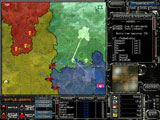 While
seasoned veterans normally are aware of the need to work with each other and to assist
newer players to learn their roles on the field, human nature also plays a part in the
game. Stupidity, pride, inexperience, and a host of other human weaknesses also rear their
ugly heads on the battlefield. Often, this has left me grinding my teeth after a close
battle that should have been won except for some glory hog who left his position to try
and get an easy kill so that he/she could advance a level. They might have gotten the
experience they needed, but left the rest of us hanging out to dry. This might sound like
a criticism, but is indeed the opposite. This type of player interaction only works to
heighten the reality of the battle environment, which only increases my level of enjoyment
and hampers my efforts to sleep, eat, and function as a normal human being with a job and
other responsibilities.
While
seasoned veterans normally are aware of the need to work with each other and to assist
newer players to learn their roles on the field, human nature also plays a part in the
game. Stupidity, pride, inexperience, and a host of other human weaknesses also rear their
ugly heads on the battlefield. Often, this has left me grinding my teeth after a close
battle that should have been won except for some glory hog who left his position to try
and get an easy kill so that he/she could advance a level. They might have gotten the
experience they needed, but left the rest of us hanging out to dry. This might sound like
a criticism, but is indeed the opposite. This type of player interaction only works to
heighten the reality of the battle environment, which only increases my level of enjoyment
and hampers my efforts to sleep, eat, and function as a normal human being with a job and
other responsibilities.
SG does not require a lot in terms of actual system requirements: 2 MB video
card, 600 MB of drive space, and a Pentium II processor. In terms of most games of this
nature, these are pretty low requirements. However, there is one aspect of this game that
is extremely important: the Internet access speed. Connections make or break this game,
not only for the hero but for other players as well. Whenever new players try to access a
battle, the system will pause all action until the new player is able to access the
specific server where the game is being processed. While this is done automatically,
players using slower Internet connections often cause lags in the playing time that can
seriously hamper the battle and often irritate the other players already involved. Thus,
as a recommendation, this is not a game to be played on a 14.4 or 28.8 Modem. A 56K might
pull it off, but the best results will only come from broadband, high-speed connections.
(Blessed be the name of the T1!)
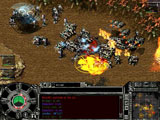 Another
small issue, insignificant in terms of the entire game yet incredibly irritating, is the
constant presentation of ads for the game during game play. The interactive screen allows
for constant messaging between players throughout the game (especially important during
large skirmishes with large numbers of allies and foes). Often, Nexon presents quotes from
gaming reviews (like this one) as messages that can be extremely irritating, especially
since everyone playing the game has already bought it. It seems like Nexon enjoys
preaching to the choir, so to speak. Like I said, it is a small thing, but it is something
that rally gets under my skin, especially when I am in the middle of a game.
Another
small issue, insignificant in terms of the entire game yet incredibly irritating, is the
constant presentation of ads for the game during game play. The interactive screen allows
for constant messaging between players throughout the game (especially important during
large skirmishes with large numbers of allies and foes). Often, Nexon presents quotes from
gaming reviews (like this one) as messages that can be extremely irritating, especially
since everyone playing the game has already bought it. It seems like Nexon enjoys
preaching to the choir, so to speak. Like I said, it is a small thing, but it is something
that rally gets under my skin, especially when I am in the middle of a game.
However, in Nexon’s defense, they have also demonstrated a level of technical
support level that I have rarely seen duplicated anywhere else. I experienced several
problems while trying to install the game and create my character. I emailed them
explaining the problem, not expecting to hear anything for at least 2-3 days. Instead, I
was involved in a quick and furious e-mail tag game that resolved the issue within four
hours of reporting it. This is to be especially admired as the entire episode took place
after what I would have thought to be normal support hours. At least two of the five stars
I give to this game are due to this level of support, which I find to be a HUGE selling
point.
